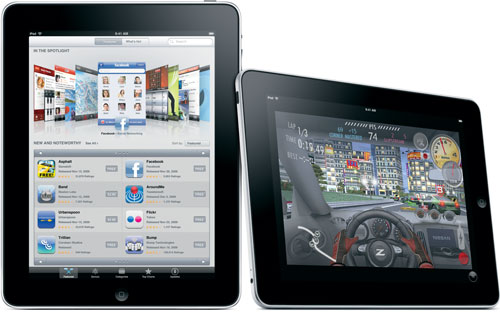Steve Jobs is known for coming up with revolutionary products that change entire industries. The Apple CEO has at least three such devices under his belt: the original Macintosh, the iPod, and the iPhone. The iPad tablet computer, which he unveiled on Wednesday in San Francisco, is not one of them.
Don’t get me wrong: the iPad is probably the best tablet computer made so far. It just lacks the features that could have made it a killer product, one that would have reinvented the publishing and videogame industries.
Allow me to dwell on the negatives first, before extolling the virtues of the iPad.
The biggest fault of the device is that, like the iPhone, you can’t run multiple applications simultaneously. Apple’s obviously done this to conserve battery life — the company says it lasts up to 10 hours — but it should have given consumers the option of enabling it.
The second big problem is the lack of a camera. This is a device crying out for two cameras, one on the front and one on the rear. It would be the perfect device for videoconferencing — using Skype for example. Alas.
Then there’s Apple’s odd decision to use a nonstandard Sim card in the 3G versions of the device. The cellular industry may have some grand plan to move to smaller Sim cards down the line, but it’s not the standard now. One assumes it will be fairly easy to pick up one of the new Sim cards from AT&T, but it could prove a big turn-off for consumers outside the US. It’s also annoying that the device doesn’t support cellular voice calling.
Another niggle is the size of the bezel around the screen. I’d have liked to have seen more of the surface of the device dedicated to the actual display area. But I guess that was an engineering issue. Hopefully the bezel will get smaller in future editions.
The last complaint I have is the lack of ports. Jobs loves minimalism in design, but the iPad really could have done with at least one USB port and an HDMI port to allow users to hook the device up to a high-definition TV or computer monitor.
Then there are the positive aspects.
The biggest plus is that it’s relatively cheap. Most commentators had expected it to cost between US$700 and $1 000. At $499 for the entry-level version with 16GB of solid-state storage, it’s well priced. Once shipping costs and taxes are taken into account, South Africans should be able to pick one up for around R5 500. It’s not as cheap as an Amazon.com Kindle, but it does much more than a Kindle, too.
Those looking for a dedicated e-reader, though, are probably better off considering a device like the Kindle that is easier on the eyes. The iPad’s backlit screen is unlikely to be conducive for long stretches of intensive reading.
Another big plus of the iPad is the fact that applications written for the iPhone and the iPod touch — almost all 140 000 of them — should run flawlessly. They can either be run at their original screen size, or “pixel-doubled” to fill the iPad’s screen. Being able to offer a full range of applications at launch is a big selling point for the product.
The online bookstore also looks well designed, though there are questions about whether the store will be available in versions of the device sold in international markets. Apple says it expects to begin selling the iPad internationally by mid-2010, but if the bookstore is disabled it will detract from the value of the device. Given that South Africans still can’t buy and download music in the iTunes Store, I am not hopeful we’ll get the online bookstore here any time soon.
From demonstrations I’ve seen, the iPad also looks incredibly fast — much snappier than the iPhone. Journalists who were in San Francisco for the launch say it runs like greased lightning.
Of all the mock-ups and designs I’ve seen of tablet computers to date, the iPad outshines them all. However, it’s far from being as “insanely great” — Apple’s term for the first Macintosh — as it could have been.
On the plus side, that means there’s plenty of room for improvement in the iPad 2. It also means there’s room for competitors to outdo Apple. And competition, ultimately, will drive innovation in tablet computing.
Did Jobs live up to the unprecedented hype that preceded the launch of the iPad? The answer to that question, clearly, is “no”. Is the iPad going to be the flop that some commentators have suggested? Again, the answer to that is almost certainly “no”.
The iPad is a good first attempt in what is still an emerging computing category. The trouble is, people have come to expect more than just “good” from Steve Jobs. They want “insanely great” products from him every time. — Duncan McLeod, TechCentral
- Subscribe to our free daily newsletter
- Follow us on Twitter or on Facebook





